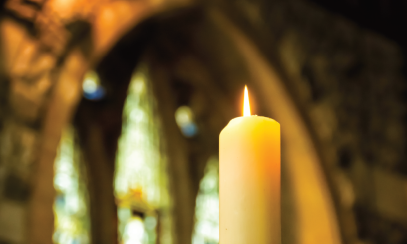
Dear Father Joe: Can Mass Ever Be Irreverent?
I have a friend who has listened to some podcasts and read some websites that are quite angry about how the Church has changed in the past few decades. She says everything was much more reverent before the 1960s and that we should go back to the way things used to be. This is making me question what happens at Mass on Sunday.
OK — you’ve hit the spot a lot of people do. As we explore our faith and try to grow into it, we will find passionate, articulate people who try to bring us to agreement with their viewpoint. Sometimes, it can be elevating and helpful, but other times, it can be a spiritual black hole where we end up drawn into their passion, instead of into the love of Christ.
Let’s walk through this a bit.
The first thing I urge you to do is consider the source. If a person’s primary source of income seems to be telling everyone what the Church is doing wrong, then you should ignore them. They have a vested interest in stirring up trouble.
If every time you read a website’s content, you get angry/indignant/scared, then you should ignore them. True faith leads to joy, not anger and fear.
If someone’s ministry/website rarely talks about Jesus, never seems to be joyful and/or spends an inordinate amount of time advocating for a political party, you should ignore them. We are called to follow Christ, not a political party.
One force at work right now in Catholicism urges us to reject the changes to the liturgy that began before the Second Vatican Council and continued after the council. Many of these folks are sincere in their belief that the liturgy today lacks the solemnity and mystery they believe was more visible in the past. Other people have simply hijacked this discussion as a pretext to criticize the Church and accuse it of doing everything wrong.
Some people point to plummeting Mass attendance in the U.S., as well as to lack of reverence and Catholic practice. They believe this has all occurred due to liturgical changes they associate with Vatican II, but they are seeing correlation as causation.
This simplistic approach ignores the issues Jesus focused on, and quite literally embraces the answers Jesus condemned. Allow me to explain.
Jesus condemned religiosity that defined “righteousness” as something humans can pull off by “doing it right.” He explicitly challenged people like the Pharisees, who seemed to revel in condemning those who didn’t follow the details of religious practice the same way they did. This is not arguable — read the Gospels.
It’s simply too easy to pretend that the waning practice of Catholicism in the West is about how we pray Mass, because we can change that without any kind of interior conversion. It’s harder to face the truth: We modern Christians have moved God to the back burner. We are focused on what’s good for us more than what’s good for our whole community — and so we want things done our own way or we walk away.
Beyond all this, it is simply easier to pretend a Church we never saw was perfect. The reality we live in is always messier than the one we never experienced. Our bias will always be toward what we think might have been or what we believe could be. I can share multiple stories of elderly people who describe liturgies that felt rushed, mumbled and disconnected from the lay people in the pews.
I would suggest that holiness lies in living in the present.
Here’s the key, folks: Trying to control what we cannot or should not has made some of us unhappy, bitter, perpetually indignant or angry. In talking to innumerable people considering conversion to Catholicism, often it’s not the doctrines or dogmas that give most serious seekers pause, it’s the marketed rage of “Catholic” media and their faithful acolytes who can’t seem to find happiness.
I beg of you to avoid that black hole. It lures you in with easy answers and then, before you know it, you can’t even enjoy praying Mass without being enraged that others aren’t doing it right. You won’t find “meek and humble of heart,” which is the Jesus standard; instead, you may find folks who complain about the liturgy or their pastor or the “new” translation of the Mass. The joy of the Gospel, the Eucharist and the sacred tradition of the Church are the hallmarks of our Catholic faith. Recall Romans 15:13: “May the God of hope fill you with all joy and peace in believing, so that by the power of the Holy Spirit you may abound in hope.”
Salvation is a messy business because we are messy people. The Incarnation of God in the person of Jesus was anything but neat and orderly.
As God’s Church on earth, and as disciples of Jesus Christ, we can work together in our parishes and dioceses to help our Church be more reverent. In an upcoming column, I will try to offer some ways that we can, in fact, help our Church to be more holy, reverent, joyful and dignified in our sacred worship.



